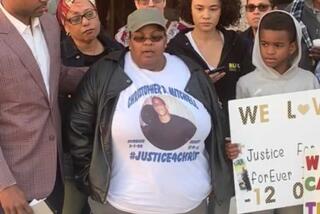Justices Let Improper-Arrest Decision Stand : Murder Case Might Not Survive Court Ruling
- Share via
The U. S. Supreme Court on Tuesday let stand a lower court’s ruling that police acted without probable cause in arresting the prime suspect in the murder of a San Diego teen-ager.
The high court’s decision, made without comment, could be fatal to the prosecution’s case against Mark A. Radke, 22, who is charged with murder in the January, 1988, slaying of Mira Mesa High School student Jeffrey V. Rudiger. Because the arrest was declared unlawful, evidence gathered as a result of it is inadmissible in court.
Radke’s attorney, Douglas Brown, said he would immediately file a motion in San Diego Superior Court seeking dismissal of the charges against his client.
“I think a strong argument can be made that the evidence remaining in this case . . . is insufficient to justify a trial or a conviction,” Brown said.
Deputy Dist. Atty. Thomas McArdle expressed disappointment at the Supreme Court’s decision, noting that “it’s fairly obvious this is not a positive thing for our case.” He added, however, that it is still unclear precisely which evidence the court will prohibit prosecutors from presenting.
“This is a negative, and it hurts, but whether or not the case will survive depends on rulings that have not yet been made,” McArdle said.
Rudiger was a 16-year-old high school junior when he was last seen the evening of Jan. 21. The next day, his handcuffed, partly clothed body was found in an alley near a Scripps Ranch commercial center. He appeared to have been struck a number of times with a hammer or similar blunt object; two bloody knives were found nearby.
Radke, who had worked with Rudiger at a Chuck E. Cheese pizza restaurant, became a suspect after co-workers at the pizza parlor told police the pair were planning to meet the night Rudiger disappeared. Suspicion grew when detectives examining Radke’s car on Jan. 22 found that the tire tread appeared to match marks left in a pool of blood at the murder scene.
Later that day, investigators confronted Radke when his car was stopped at a red light and said they wanted to discuss Rudiger’s death. Observing that his hands were cut and swollen, as if he had been in a fight, and aware of the condition of Rudiger’s body, police said, they decided to detain him for questioning.
Brown, however, challenged his client’s detention, claiming that it was made without probable cause and was a violation of Radke’s Fourth Amendment right to protection against unreasonable searches and seizures. In July, the 4th District Court of Appeal agreed, concluding that detectives erred in placing Radke in handcuffs while transporting him to the station and in drawing a revolver during the stop.
The ruling appeared to make all evidence stemming from the arrest--including Radke’s statements, the condition of his hands and blood of Rudiger’s type that was found inside and on the exterior of the car and on Radke’s jacket--off limits to the prosecution.
In October, the state Supreme Court declined to consider the district attorney’s appeal of the appellate court’s decision, prompting the petition to the U. S. Supreme Court.
In seeking a review by the high court, prosecutors argued that the appellate court ruling conflicted with other U. S. Supreme Court decisions, “which hold that the Fourth Amendment does not protect a person’s physical characteristics which are exposed to the public.”
The prosecutors’ brief said that Radke’s arrest “directly produced an incriminating admission during his interrogation and physical evidence linking him to the crime”--information that is “essential” to the prosecution. The lower court’s decision “inflicts severe and probably fatal damage” to the case against Radke, the brief said.
Rudiger’s relatives, who offered a $10,000 reward in appealing to the public for clues useful to the case, could not be reached for comment Tuesday. But Judith Rowland of the California Center for Victimology, which has aided the family, said they were “devastated” by the high court’s decision.
‘Case Has Been Gutted’
“This case has just been gutted,” Rowland said. “It was something we were told to prepare for, but still, the idea of (Radke) walking away a free man in spite of all the evidence against him, it’s just so hard to accept. Defendants should have rights too, but this is just too high a price to pay for some police slip-up. This is our worst nightmare.”
Brown said that whether the case goes forward depends on the outcome of an upcoming “legal contest” over which facts should and should not be permitted before a jury.
“Based on my reading of the law, the only evidence they may use is that obtained before Mr. Radke’s arrest,” Brown said. “None of that evidence proves beyond a reasonable doubt that Mr. Radke committed the homicide.”
But prosecutors are likely to argue that some evidence should survive the exclusionary test because it inevitably would have been uncovered by investigators.
Radke, who worked as a video-game technician at the pizza parlor, is free on $300,000 bail and is living in San Diego.
More to Read
Sign up for Essential California
The most important California stories and recommendations in your inbox every morning.
You may occasionally receive promotional content from the Los Angeles Times.













